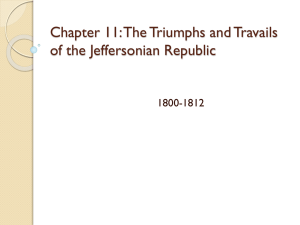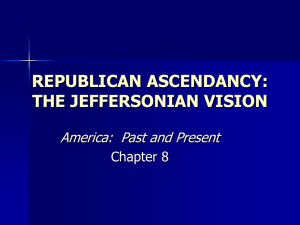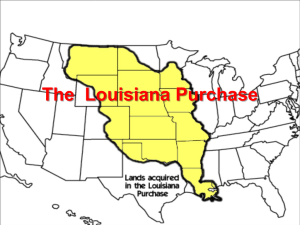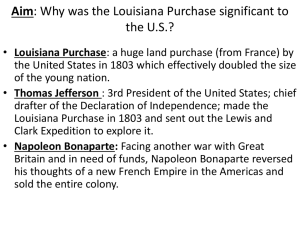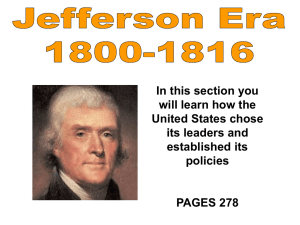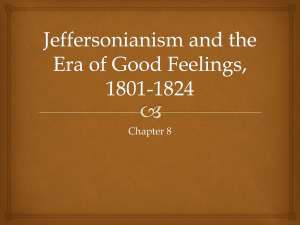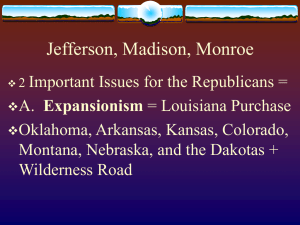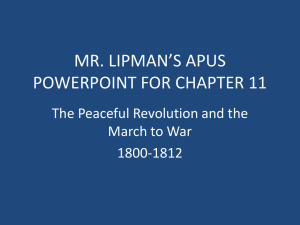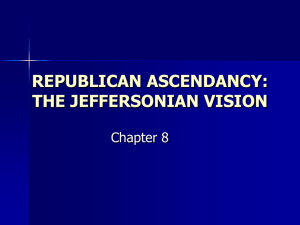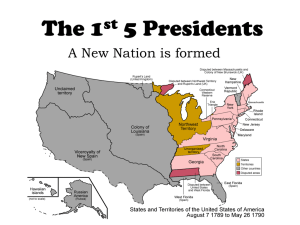Ch 11 The Jeffersonian Republic
advertisement
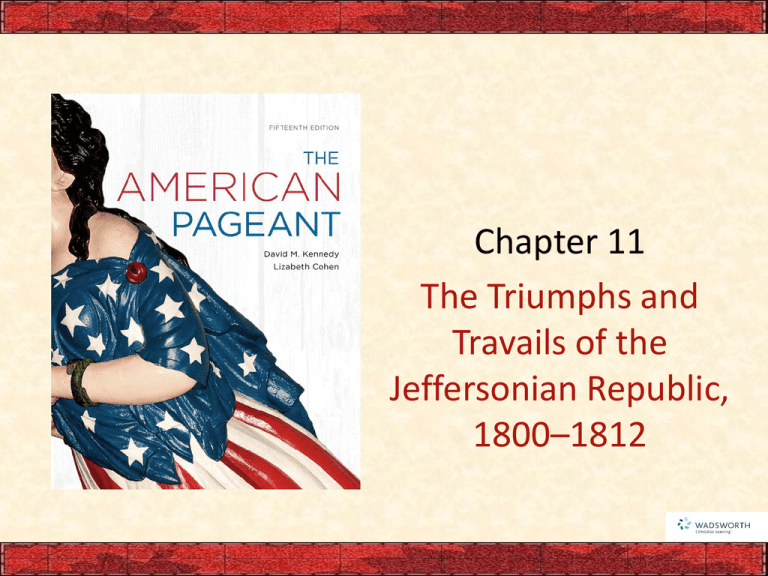
Chapter 11 The Triumphs and Travails of the Jeffersonian Republic, 1800–1812 I. Federalist and Republican Mudslingers – In fighting for survival, the Federalists labored under heavy handicaps: • Alien and Sedition Acts aroused a host of enemies • The refusal of Adams to give them a rousing fight with France • Their feverish war preparations had swelled the federal debt and required new taxes including a stamp tax I. Federalist and Republican Mudslingers (cont.) • The war scare had petered out, and the country was left with an all-dressed-up-but-no-place-to-go feeling • Military preparations were not only unnecessary but extravagant – The Federalists concentrated their fire on Jefferson himself: • He became the victim of rumors: – Robbing a widow and her children of a trust fund – Fathering numerous mulatto children by his slave women – Long intimacy with Sally Hemings. I. Federalist and Republican Mudslingers (cont.) – A liberal in religion, supported separation of church and state in his native Virginia – He did believe in God, but preachers throughout New England thundered against his atheism. p203 II. The Jeffersonian “Revolution of 1800” • Jefferson won by a majority of 73 electoral votes to 65 (see Map 11.1) – New York fell in Jeffersonian basket, largely because of Aaron Burr – Pull the most of his strength in the South and West – Decisive in Jefferson’s victory was the 3/5 clause of the Constitution II. The Jeffersonian “Revolution of 1800” (cont.) – Jefferson’s victory was dampened by an unexpected deadlock: • Jefferson, the presidential candidate, and Burr, the vice-presidential candidate, received the same number of electoral votes for the presidency • Under the Constitution the tie could be broken only by the House of Representatives (see Art. II, Sec. I. para. 2) – House was controlled by Federalists who preferred Burr – Jefferson, after some time and changing thinking, won the vote to make him the president. II. The Jeffersonian “Revolution of 1800” (cont.) • Sometimes referred to as the Revolution of 1800: – It was no revolution in the sense of the word – Jefferson narrowly squeaked to victory – He saw his mission: • to restore the republican experience • To check the growth of government power • To halt the decay of virtue II. The Jeffersonian “Revolution of 1800” (cont.) – No less “revolutionary” was the peaceful and orderly transfer of power: • This was a remarkable achievement for a raw young nation • It was particularly remarkable in that comparable act would not have taken place in Britain – Americans could take justifiable pride in the vigor of their experiment in democracy. Map 11-1 p204 III. Responsibility Breeds Moderation • “Long Tom” Jefferson was inaugurated president on March 4, 1801: – In the swampy village of Washington, the crude new national capital – He spurned a horse-drawn coach and strode by foot to the Capitol from his boardinghouse – His inaugural address: • Beautifully phrased, was a classic statement of democratic principles III. Responsibility Breeds Moderation (cont.) – Washington lent itself admirably to the simplicity and frugality of the Jeffersonian Republicans: • Contrasted to the elegant atmosphere of Federalist Philadelphia, the former temporary capital • He extended democratic principles to etiquette – Established the rule of pell-mell at official dinners—that is, seating without regard to rank. • He was shockingly unconventional in receiving guests • He started the precedent of sending messages to Congress to be read by a clerk III. Responsibility Breeds Moderation (cont.) • Jefferson was forced to reverse many of the political principles he had so vigorously championed: – One was the scholarly private citizen, who philosophized in his study – The other was the harassed public official – The open-minded Virginian was therefore consistently inconsistent; it is easy to quote one Jefferson to refute the other. III. Responsibility Breeds Moderation (cont.) • Jefferson’s Democratic-Republicans and the eviction of Federalists marked the first party overturn in American history. – Jefferson showed unexpected moderation – He dismissed few public servants for political reasons – Patronage-hungry Jeffersonians watched the Federalist appointees grow old in office and “few die, none resign” p205 p206 p206 p207 p207 IV. Jeffersonian Restraint • At the outset Jefferson was determined to undo the Federalist abuses: – The hated Alien and Sedition Acts had expired – Pardoned the “martyrs” who were serving sentences under the Sedition Act • and the government remitted many fines – Jeffersonians enacted the new naturalization law of 1802: – It reduced the requirement of 14 years of residence back to the requirement of 5 years. IV. Jeffersonian Restraint (cont.) • He had Congress repeal the excise tax. • Albert Gallatin proved to be an able secretary of the Treasury – He agreed with Jefferson that a national debt was a bane rather than a blessing – By strict economy they reduced substantially the debt while balancing the budget – The Jeffersonians left the Hamiltonian framework essentially intact. IV. Jeffersonian Restraint (cont.) – They did not temper with the Federal program for funding the national debt at par and assuming the Revolutionary War debts of the states – They launched no attack on the Bank of the United States, nor did they repeal the mildly protective Federal tariff • In future years Federalism rechartered a bigger bank and bolstered the protective tariff to higher levels. • Jefferson’s moderation furthered the “Revolution.” V. The “Dead Clutch” of the Judiciary • Judiciary Act of 1801 – One of the last laws passed by the Federalists • It created sixteen new federal judgeships and other judicial offices • Adams remained until he signed the commission for the Federalist “midnight judges.” – It aroused bitter resentment: • “Packing” lifetime posts with anti-Jeffersonians. – The new elected Congress repealed the Judiciary Act of 1801 the year after its passage. V. The “Dead Clutch” of the Judiciary (cont.) • Jeffersonians were also after Chief Justice John Marshall: – He had dominated the Supreme Court with his powerful intellect and personality – He shaped the American legal tradition more profoundly than any other single figure – He was committed to strengthen the power of the federal government – He served 34 years under various presidents V. The “Dead Clutch” of the Judiciary (cont.) • The “midnight judges” presented Marshall with a historical opportunity: • William Marbury was appointed a justice of the peace by Adams • He sued when he learned that his commission would not be delivered • Chief Justice Marshall dismissed Marbury’s suit • Marbury v. Madison (1803) clouded the question of who had the final authority to determine the meaning of the Constitution V. The “Dead Clutch” of the Judiciary (cont.) – Marshall promoted the principle of “judicial review”— • The idea that the Supreme Court alone had the last word on the question of constitutionality • Marshall inserted the keystone into the arch that supports the tremendous power of the Supreme Court in American life – Jefferson urged the impeachment of Supreme Court justice Samuel Chase on “high crimes.” – The impeachment failed, no future attempts. p209 VI. Jefferson, a Reluctant Warrior • First action of Jefferson was to reduce the military establishment: • To a mere police force of 25,000 officers and men • He wanted to forgo the military and win friends through “peaceful coercion” • Pirates of the North African Barbary States (see Map 11.2) made a national industry of blackmailing and plundering merchant ships that ventured into the Mediterranean. • War across the Atlantic was not part of Jefferson’s vision. VI. Jefferson, a Reluctant Warrior (cont.) • The showdown came in 1801-1805, the Tripolitan War: • He sent the infant army to the “shores of Tripoli” • Four years of intermittent fighting • He succeeded in extorting a treaty of peace from Tripoli in 1805; bargain price of $60,000—a sum representing ransom payment for captured Americans • He advocated a large number of little coastal craft • Also 200 tiny gunboats were constructed VII. The Louisiana Godsend • 1800 a secret pact was signed: • Napoleon Bonaparte induced the king of Spain to cede to France the immense trans-Mississippi region of Louisiana, including New Orleans area • The Spaniards at New Orleans withdrew the right to deposit guaranteed America by Pinckney’s Treaty of 1795 (see p. 193) • Hoping to quiet the clamor of the West, Jefferson in 1803 sent James Monroe to Paris to join with Robert R. Livingstone, the regular minister there VII. The Louisiana Godsend (cont.) – They were instructed to buy New Orleans and as much land as possible for $10 million – Napoleon suddenly decided to sell all Louisiana and abandon his dream of a New World empire – He failed in his efforts to reconquer the sugar-rich island of Santo Domingo (Haiti) – Rebellious enslaved Africans had struck for their freedom in 1791. Their revolt was ultimately broken, but the island’s second line of defense—mosquitoes carrying yellow fever— had swept away thousands of crack French troops. VII. The Louisiana Godsend (cont.) • After the Haitian Revolution Santo Domingo could not be had, except at a staggering cost, hence there was no need for Louisiana’s food supplies • To keep Louisiana from the British Napoleon decided to sell it to the Americans and pocket the money for his schemes nearer to home. • Robert Livingston was busy negotiating , when the French foreign minister asked him what he would give for all of Louisiana. VII. The Louisiana Godsend (cont.) • On April 30, 1803, treaties were signed ceding Louisiana to the United States for about $15 million – Plus additional treaties for an immeasurable tract entirely to the west—an area that would more than double the size of the United States. – Once again the two Jeffersons wrestled with each other: – The theorist and former strict constructionist versus the democratic visionary. Jefferson submitted the treaties to the Senate, while admitting the purchase unconstitutional. Map 11-2 p211 p211 p212 VIII. Louisiana in the Long View • Louisiana Purchase— • America secured the western half of the richest river valley in the world • And laid the foundation of a future major power • The transfer established valuable precedents for future expansion on the basis of equal membership • This was imperialism with a new and democratic face • It also contributed to making operational the isolationist principles of Washington’s Farewell Address. VIII. Louisiana in the Long View (cont.) • The Lewis and Clark’s Corps of Discovery: • 1804 Jefferson sent his personal secretary, Meriwether Lewis, and army officer William Clark to explore the northern part of the Louisiana Purchase • The exploration took 2 ½ years and yielded a rich harvest of scientific observation, maps, knowledge of the Indians in the region, and hair-raising wilderness adventure stories • The explorers demonstrated the viability of an overland trail to the Pacific VIII. Louisiana in the Long View (cont.) • Thousands of missionaries, fur-traders, and pioneering settlers made their way to claim the Oregon Country • Zebulon M. Pike trekked to the headwaters of the Mississippi River in 1805-1806 • The next year Pike ventured into the southern portion of Louisiana Territory, where he sighted the Colorado peak that bears his name. p213 p214 p214 IX. The Aaron Burr Conspiracies • The Louisiana Purchase greatly expanded the fortunes of the United States and the power of the federal government • In the short term, the vast expanse of territory and the feeble reach of the government obliged to control it raised fears of secession and foreign intrigue (see Map 11.3) • Aaron Burr, Jefferson’s first-term vice president, provoked and justified such fears • Burr joined a group of Federalist extremists to plot the secession of New England and New York IX. The Aaron Burr Conspiracies (cont.) • Alexander Hamilton exposed and foiled the conspiracy • Incensed, Burr challenged Hamilton to a duel • Burr killed Hamilton with one shot. Burr’s pistol blew the brightest brain out of the Federalist party and destroyed the only hope of effective leadership. • Burr turned his disunionist plottings to the transMississippi West. • There he struck up an allegiance with General James Wilkinson, the unscrupulous military governor of Louisiana Territory and a secret agent for Spain. IX. The Aaron Burr Conspiracies (cont.) • Wilkinson’s army was to meet Burr and 60 followers at Natchez • However, when Wilkinson learned that Jefferson had gotten wind of the plot, Wilkinson betrayed Burr and fled to New Orleans • Burr was arrested and tried for treason • Chief Justice John Marshall, strictly interpreting the Constitution, insisted that a guilty verdict required proof of overt acts of treason, not merely treasonous intentions (see Art. III, Sec. III) • Burr was acquitted and fled to Europe IX. The Aaron Burr Conspiracies (cont.) – Burr urged Napoleon to make peace with Britain and launch a joint invasion of America. – Burr’s insurrectionary brashness demonstrated that it was one thing for the United States to purchase large expanses of western territory but quite another for it to govern them effectively. Map 11-3 p215 X. A Precarious Neutrality • Jefferson was triumphantly reelected in 1804: – 162 electoral votes to only 14 votes for his Federalist opponent – Napoleon deliberately provoked a renewal of his war with Britain–an awesome conflict that raged on for eleven long years. – The first two years of war a maritime United States enjoyed commercial pickings. X. A Precarious Neutrality (cont.) • 1805 the Battle of Trafalgar: – Lord Nelson smashed the combined French and Spanish fleets of the coast of Spain – This ensured Britain’s supremacy on the sea • The Battle of Austerlitz in Austria—The Battle of the Three Emperors—Napoleon crushed the combined Austrian and Russian armies – Ensuring his mastery of the land – France and Britain now reigned supreme X. A Precarious Neutrality (cont.) • 1806 London issued a series of Orders in Council: • Closed the European ports under French control to foreign shipping, including American, unless the vessels stopped at a British port • Napoleon struck back, ordering the seizure of all merchant ships, including American, that entered British ports • They was no way to trade with either nation • American vessels were caught X. A Precarious Neutrality (cont.) • Impressment— – the forcible enlistment of sailors: – Crude form of conscription by the British – Had been employed for years – Some 6000 bona fide U.S. citizens were impressed by the “piratical man-stealers” of Britain from 1808 to 1811 X. A Precarious Neutrality (cont.) • The Chesapeake affair: • A royal frigate overhauled a U.S. frigate, the Chesapeake, ten miles of the coast of Virginia • The British captain bluntly demanded the surrender of four alleged deserters • London had never claimed the right to seize sailors from a foreign warship • The American commander, though totally unprepared to fight, refused the request • The British warship fired three devastating broadsides at close range X. A Precarious Neutrality (cont.) • Three Americans were killed and 18 wounded • Four deserters were dragged away, and the bloody hulk called the Chesapeake limped back to port • Britain was clearly in the wrong, as the London Foreign Office admitted • But London’s contrition availed little • A roar of national wrath went up from infuriated Americans • Jefferson, the peace lover, could easily have had war if he had wanted it XI. The Hated Embargo (cont.) • National honor would not permit a slavish submission to British and French mistreatment: • The warring European nations depended heavily on United States for raw materials and foodstuffs • Jefferson thought that if America voluntarily cut off its exports, the offending powers would have to bow • Congress issued the Embargo Act late in 1807: – The law forbade the export of all goods from the United States, whether in American or foreign ships XI. The Hated Embargo (cont.) – This embargo embodied Jefferson’s idea of “peaceful coercions” – The American economy staggered under the effect of the embargo long before Britain or France began to bend – An enormous illicit trade mushroomed in 1808, especially along the Canadian border – The embargo had the effect of reviving the moribund Federalist party – On March 1, 1809 , three days before Jefferson retired, Congress repealed the embargo. • The Non-Intercourse Act formally opened trade with all nations, except Britain and France XI. The Hated Embargo (cont.) – Why the embargo act failed after 15 months: • Jefferson underestimated the determination of the British and overestimated the dependence of both belligerents on America’s trade • Jefferson miscalculated the unpopularity of such a self-crucifying weapon and the difficulty of enforcing it. – New England plucked a new prosperity from the ugly jaws of the embargo. XI. The Hated Embargo (cont.) • The resourceful Yankees reopened old factories and erected new ones: • The real foundations of modern America’s industrial might were laid behind the protective wall of the embargo • Followed by nonintercourse and the War of 1812 • Jefferson, the avowed critic of factories, may have unwittingly done more for American manufacturing than Alexander Hamilton, industry’s outspoken friend. p216 p217 XII. Madison’s Gamble • Madison took the presidential oath on March 4, 1809: – As the awesome conflict in Europe was roaring to a climax – The Non-Intercourse Act of 1809 was to expire in 1810 • Congress dismantled the embargo completely with a bargaining measure—Macon’s Bill No. 2. XII. Madison’s Gamble (cont.) • Macon’s Bill No. 2: • A dangle—if either Britain or France repealed its commercial restrictions, America would restore its embargo against the nonrepealing nations • To Madison the bill was a shameful capitulation • Word came from Napoleon’s foreign minister that the French decrees might be repealed if Britain also lifted it Orders in Council • Madison knew not to trust Napoleon, but he gambled. XII. Madison’s Gamble (cont.) • Madison’s gamble: • That the threat of seeing the United States trade exclusively with France would lead the British to repeal their restrictions—and vice versa • The terms of Macon’s Bill gave the British 3 months to live up to their promise of revoking the Orders in Council and reopening the Atlantic to neutral trade • They did not. Madison’s gamble failed. p219 XIII. Tecumseh and the Prophet • Twelfth Congress met late 1811 – The older “submission men” had been replaced with young hotheads, many from the South and West: • Dubbed war hawks by their Federalist opponents, the newcomers were on fire for a new war • They also wanted to wipe out the renewed Indian threat for pioneer settlers coming into the transAllegheny wilderness XIII. Tecumseh and the Prophet (cont.) • Two Shawnee brothers, Tecumseh and Tenskwatawa, known to non-Indians as “the Prophet,” concluded the time had come to stem this onrushing tide • They began to weld together a confederacy of all the tribes west of the Mississippi • Frontiersmen and their war-hawk spokesmen became convinced that the British “scalp buyers” in Canada were nourishing the Indians’ growing strength • In the fall of 1811, William Henry Harrison gathered an army and advanced on Tecumseh’s headquarters. XIII. Tecumseh and the Prophet (cont.) – Tecumseh was absent, but the Prophet attacked Harrison’s army, with a small force of Shawnees • The Shawnees were routed and their settlement was burned • The Battle of Tippecanoe made Harrison a national hero • It discredited the Prophet and drove Tecumseh into an alliance with the British. – When America’s war with Britain came, Tecumseh fought for the redcoats until his death in 1813 at the Battle of the Thames. With him perished the dream of an Indian confederacy. p220 p221 p222
